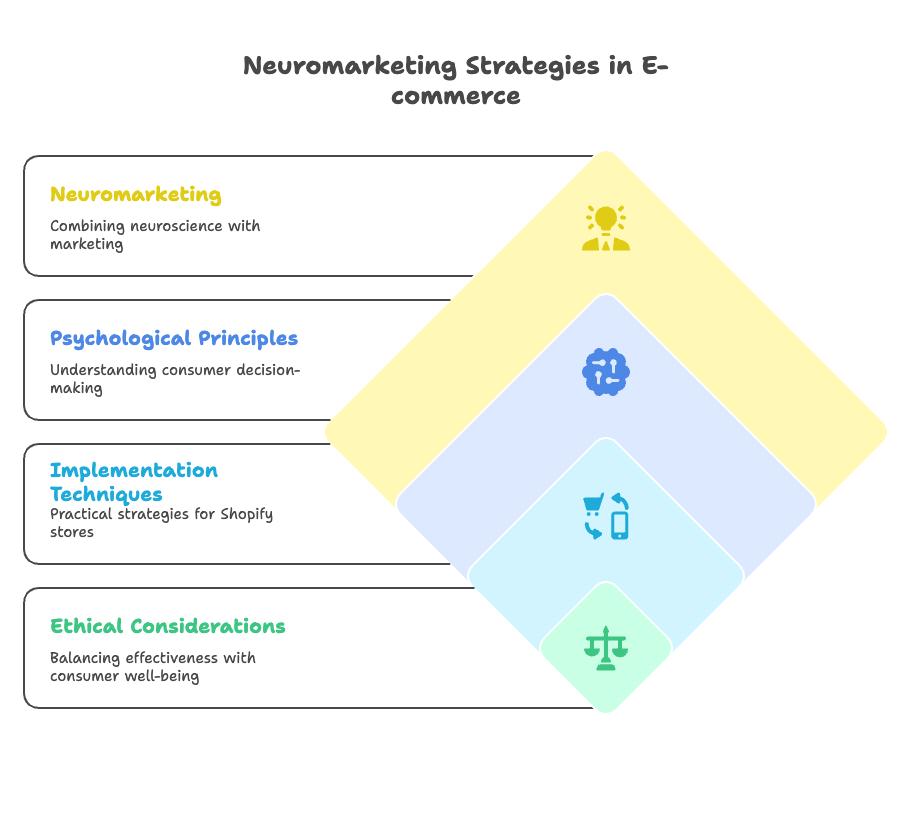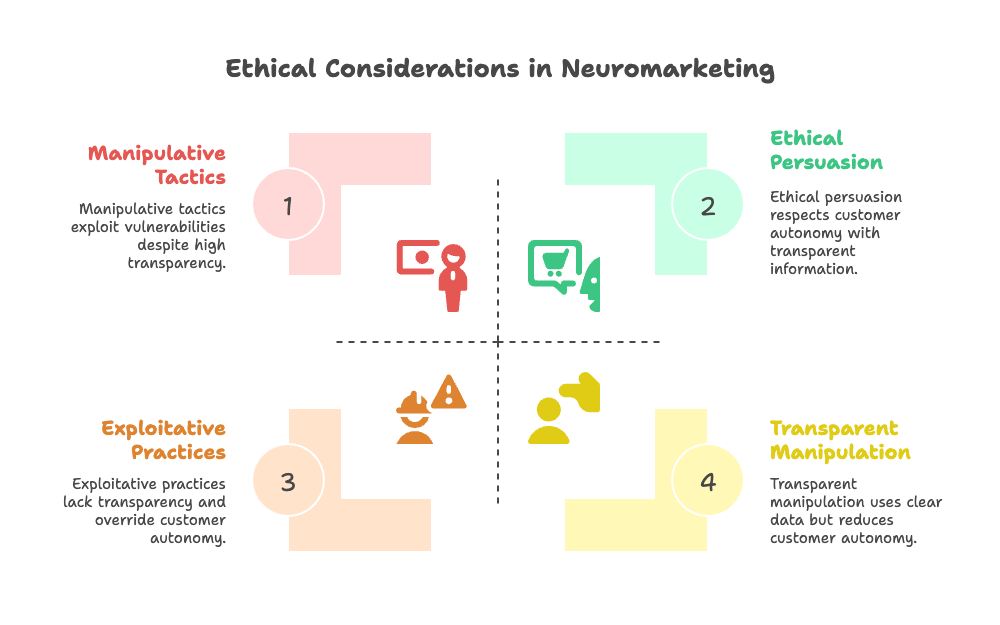Every time a customer lands on your Shopify store, their brain is making thousands of unconscious decisions. The color of your “Add to Cart” button. The placement of your product images. Even the way you phrase your shipping policy. These seemingly small details trigger powerful neurological responses that can make or break a sale.
But here’s the thing—with great power comes great responsibility.
Neuromarketing has revolutionized how we understand online shopping behavior. It’s given Shopify store owners unprecedented insights into the subconscious drivers that influence purchasing decisions. Yet this same power raises critical questions about ethics, consumer autonomy, and the fine line between helpful persuasion and manipulative exploitation.
In this article, you’ll discover how to harness neuromarketing techniques responsibly. We’ll explore the ethical boundaries that separate trustworthy businesses from predatory ones, examine real-world case studies of both success and failure, and provide you with actionable guidelines to build a thriving Shopify store without compromising your customers’ well-being or your brand’s integrity.
Understanding Neuromarketing in the Digital Shopping World

Neuromarketing combines neuroscience insights with marketing strategies to understand how consumers’ brains respond to different stimuli. For Shopify store owners, this means leveraging scientific knowledge about human psychology to create more effective—and hopefully more ethical—shopping experiences.
Think about the last time you bought something online impulsively. Was it the urgent “Only 3 left in stock!” message? The perfectly timed popup offering a discount just as you were about to leave? Or perhaps the way the product photos made you imagine yourself using the item?
These aren’t accidents. They’re carefully crafted psychological triggers.
Core Principles That Drive Online Behavior
The human brain processes information through two main systems. System 1 operates automatically and emotionally—it’s fast, intuitive, and heavily influenced by visual cues and past experiences. System 2 is slower, more deliberate, and analytical. Most purchasing decisions happen in System 1, often before customers even realize they’re considering a purchase.
This is why neuromarketing focuses heavily on emotional and subconscious triggers rather than purely rational arguments. Common techniques include:
- Visual hierarchy optimization that guides the eye toward key information
- Strategic color psychology to evoke specific emotional responses
- Scarcity and urgency cues that tap into fear of missing out
- Social proof elements that leverage our tendency to follow others
- Personalization algorithms that make customers feel uniquely understood
How Shopify Stores Implement These Techniques
On your Shopify store, neuromarketing might show up in surprisingly subtle ways. Your checkout flow’s design influences cart abandonment rates. The size and color of your call-to-action buttons affect conversion rates. Even your product descriptions’ language structure can trigger different emotional responses.
Consider how many successful Shopify stores use countdown timers for flash sales. These timers don’t just provide information—they create a physiological stress response that can override careful decision-making. Your brain perceives the ticking clock as a threat, triggering an urgent need to act.
But here’s where ethics enter the picture. Is this helpful or harmful?
Where Psychology Meets Responsibility
The power to influence subconscious decision-making raises profound ethical questions. When does helpful guidance become manipulation? How do we balance business goals with respect for customer autonomy?

Persuasion vs. Manipulation: Drawing the Line
Ethical persuasion enhances the customer’s decision-making process. It provides relevant information, removes friction, and helps people make choices aligned with their genuine needs and preferences. Persuasion respects the customer’s ability to make informed decisions.
Manipulation, however, exploits psychological vulnerabilities to override rational decision-making. It creates artificial urgency, exaggerates benefits, or deliberately obscures important information to push customers toward purchases they might later regret.
The difference often lies in intent and transparency. Are you using psychological insights to genuinely help customers find products they’ll love? Or are you exploiting cognitive biases to maximize short-term sales regardless of customer satisfaction?
Let’s look at a practical example. A Shopify store selling skincare products might use social proof by displaying recent customer reviews prominently. This helps new visitors understand others’ experiences and make informed decisions—that’s ethical persuasion. But if that same store fabricates reviews or only shows positive feedback while hiding negative experiences, it crosses into manipulation territory.
The Data Privacy Minefield
Effective neuromarketing often relies on detailed customer data. Purchase history, browsing behavior, demographic information, and even biometric data can inform personalization strategies. But collecting and using this data raises serious privacy concerns.
Modern consumers are increasingly aware of how their data is being used. They want transparency about what information you’re collecting, how you’re using it, and who you’re sharing it with. Failing to provide this transparency doesn’t just violate ethical principles—it can also violate laws like GDPR and CCPA.
More importantly, customers who feel their privacy has been violated are unlikely to become loyal advocates for your brand. Trust, once broken, is incredibly difficult to rebuild.
Protecting Psychological Well-being
Perhaps the most serious ethical concern involves protecting vulnerable consumers from exploitation. Neuromarketing techniques can be particularly effective on people experiencing emotional distress, financial hardship, or mental health challenges.
Consider how a fitness brand might market to people struggling with body image issues. Ethical marketing would focus on health, wellness, and realistic outcomes. Unethical marketing might exploit insecurities, promote unrealistic body standards, or encourage unhealthy behaviors.
The question every Shopify store owner should ask: Would I be comfortable if my marketing techniques were used on my family members during their most vulnerable moments?
Building an Ethical Neuromarketing Strategy
Creating a responsible approach to neuromarketing doesn’t mean abandoning effective techniques. Instead, it means implementing them with careful consideration for customer well-being and long-term relationship building.
Transparency as a Foundation
Start with radical transparency about your business practices. This means clear, accessible privacy policies that explain data collection in plain language. It means honest product descriptions that include potential drawbacks alongside benefits. It means being upfront about promotional tactics and their psychological effects.
For example, if you’re using urgency marketing with countdown timers, consider adding subtle disclaimers like “This promotion ends on [date], but similar offers may be available in the future.” This maintains the promotional effectiveness while giving customers context for their decision-making.
Transparency also extends to your team. Ensure everyone involved in marketing understands the ethical implications of the techniques you’re using. Regular training on digital ethics can help maintain standards as your business grows.
Respecting Customer Autonomy
Design your customer experience to enhance rather than override decision-making capabilities. This might mean:
- Providing comprehensive product information, including potential downsides
- Offering easy comparison tools between different products
- Including prominent customer service contact information
- Making return and refund policies easily accessible
- Avoiding high-pressure tactics that rush decision-making
Consider implementing “cooling-off” periods for high-value purchases. Some ethical retailers send confirmation emails asking customers to verify they want to proceed with expensive orders, giving them a chance to reconsider without pressure.
Data Ethics in Practice
Responsible data handling goes beyond legal compliance. It means collecting only the information you genuinely need, storing it securely, and using it in ways that benefit customers as much as your business.
Shopify provides built-in tools for data protection, but you can go further. Consider offering customers granular control over how their data is used. Allow them to opt out of certain types of personalization while still enjoying other benefits of your service.
Regular audits of your data practices can help identify potential issues before they become problems. Ask yourself: What would happen if all our data practices were made public tomorrow? Would we be proud of what customers discovered?
Learning from Success and Failure
Real-world examples offer powerful lessons about the long-term consequences of ethical choices in neuromarketing.
Success Stories: Ethical Neuromarketing Done Right
Patagonia, the outdoor clothing company, has built a cult following through ethical marketing practices that align with customer values. Their “Don’t Buy This Jacket” campaign used reverse psychology effectively while genuinely promoting environmental consciousness. They leverage scarcity marketing by highlighting limited production runs, but they’re transparent about why—sustainable manufacturing limits quantity.
The subscription service Fabletics uses eye-tracking research to optimize their website design, but they combine this with clear information about subscription terms and easy cancellation processes. They’ve found that transparency actually improves customer lifetime value because it builds trust.
These brands show that ethical neuromarketing isn’t just morally right—it’s also profitable in the long term.
Cautionary Tales: When Ethics Take a Backseat
Conversely, companies that prioritize short-term manipulation over ethical practices often face serious consequences. Several major retailers have faced lawsuits and regulatory action for using “dark patterns”—deceptive design techniques that trick users into unintended actions.
These might include hidden subscription terms, confusing cancellation processes, or fake urgency timers that reset when customers return to the site. While these tactics might boost short-term conversions, they typically result in high churn rates, negative reviews, and damaged brand reputation.
The rise of consumer advocacy and social media means that unethical practices are more likely to be exposed and punished by the market than ever before.
Your Roadmap to Responsible Implementation
Building an ethical neuromarketing strategy requires systematic planning and ongoing vigilance. Here’s how to get started.
Establish Clear Ethical Guidelines
Begin by creating written ethical guidelines for your marketing activities. These should cover:
- Data collection and usage policies that go beyond legal minimums
- Approval processes for new marketing techniques or campaigns
- Regular review schedules for existing practices
- Customer feedback systems that capture concerns about marketing practices
- Rapid response protocols for addressing ethical complaints
Make these guidelines accessible to your entire team and include them in onboarding processes for new employees or contractors.
Leverage Shopify’s Ethical Features
Shopify provides numerous tools to help merchants operate ethically. Take advantage of:
- Customizable privacy settings that give customers control over data sharing
- Built-in compliance tools for various international privacy laws
- Transparent analytics that help you understand customer behavior without invasive tracking
- App marketplace filters that help you choose ethical third-party tools
Stay informed about new features and updates that can enhance your ethical practices. Shopify regularly introduces tools designed to help merchants build trust with customers.
Create Feedback Loops
Regular customer feedback is essential for maintaining ethical standards. Implement systems to:
- Survey customers about their comfort with your marketing practices
- Monitor social media and review sites for concerns about manipulation
- Track metrics that indicate customer satisfaction beyond just conversions
- Analyze customer lifetime value to ensure short-term tactics aren’t harming long-term relationships
Remember that the absence of complaints doesn’t necessarily mean the absence of problems. Many customers who feel manipulated simply leave without providing feedback.
Stay Current with Best Practices
The field of digital ethics is evolving rapidly. New research, regulations, and industry standards emerge regularly. Make ongoing education a priority by:
- Following organizations like the Neuromarketing Business & Science Association (NMBSA)
- Attending conferences and webinars on digital ethics
- Participating in industry forums and discussions
- Reading academic research on consumer psychology and ethics
Consider joining or forming peer groups with other Shopify merchants who share your commitment to ethical practices. Collective learning and accountability can strengthen everyone’s efforts.
The Future of Ethical E-commerce
As artificial intelligence and machine learning become more sophisticated, the power of neuromarketing techniques will only increase. This makes ethical frameworks more important than ever.
Consumers are becoming more savvy about marketing manipulation, and they’re increasingly choosing to support brands that align with their values. The businesses that thrive in the coming years will be those that view ethics not as a constraint on profitability, but as a competitive advantage.
Ethical neuromarketing isn’t just about avoiding harm—it’s about creating genuinely helpful, satisfying customer experiences that build lasting relationships. When customers trust your brand, they become advocates who drive sustainable growth through word-of-mouth recommendations and repeat purchases.
The choice is yours. You can use psychological insights to manipulate customers into short-term purchases, or you can use them to create shopping experiences that genuinely serve customer needs while building a thriving business.
The most successful Shopify stores of the future will be those that choose the ethical path—not despite their business goals, but because of them.
References
- Goncalves, M. (2024). “Neuromarketing algorithms’ consumer privacy and ethical issues.” Cogent Business & Management, https://www.tandfonline.com/doi/full/10.1080/23311975.2024.2333063
- “Exploring the Advancements of Neuromarketing in E-Commerce Research.” Academy of Marketing Studies Journal, https://www.abacademies.org/articles/exploring-the-advancements-of-neuromarketing-in-ecommerce-research-a-systematic-literature-review-16702.html
- Ulman, F. “Ethical Issues in Neuromarketing: I Consume, Therefore I Am.” Acibadem Mehmet Ali Aydinlar University, https://avesis.acibadem.edu.tr/yayin/411042e8-e198-497d-9262-f667daca8e32/ethical-issues-in-neuromarketing-i-consume-therefore-i-am/document.pdf
- Conick, H. “What Are the Ethics of Neuromarketing?” American Marketing Association, https://www.ama.org/marketing-news/what-are-the-ethics-of-neuromarketing/
Ready to optimize your Shopify store’s conversion rates while maintaining the highest ethical standards? Growth Suite helps you implement responsible discount strategies that boost sales without compromising customer trust. Our AI-powered platform analyzes visitor behavior to present personalized offers only to customers who genuinely benefit from them—never to those who were already ready to buy at full price. Install Growth Suite with a single click and start building a more profitable, ethical e-commerce business today!



